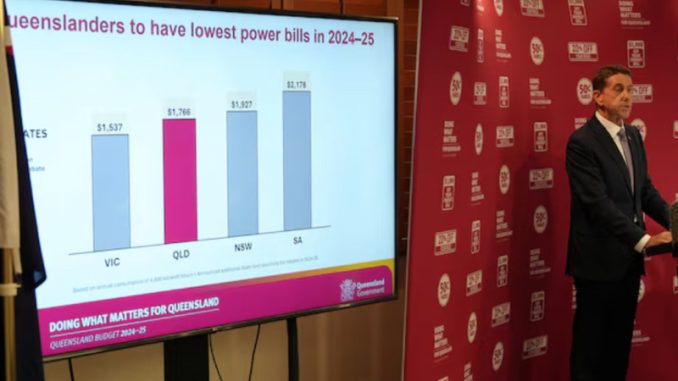
In a significant move to support its residents amid rising economic pressures, Queensland, a state in Australia, has announced a substantial budget aimed at alleviating the cost of living. This initiative, led by Queensland Treasurer Cameron Dick, involves a $3.7 billion expenditure on new cost-of-living relief measures. The state’s population of approximately 5.185 million will benefit from this pre-election budget, which unapologetically plunges the state into a forecasted $2.6 billion deficit for 2024-25.
The budget includes several measures designed to assist Queenslanders, such as freezing fees and charges, including drivers’ licenses, at a cost of $180 million for the next financial year. Additionally, a six-month trial of 50-cent public transport fares, a 20 percent reduction in car registration fees for one year, and an increase in the stamp duty threshold for first-time home buyers have already been announced.
Queensland’s government has also committed to providing a record $11.2 billion in concessions to families and businesses, with $3.7 billion allocated for new and expanded measures in the upcoming financial year. However, this ambitious spending is set against a backdrop of escalating debt, projected to reach $172 billion by 2027-28, leading to significant interest repayments.
To address the financial implications of this spending, Treasurer Dick announced the formation of a “savings” taskforce aimed at recovering $3 billion over four years. The “Smarter Spending Taskforce” will focus on reducing non-wage expenses, including government travel and reliance on contractors, while promoting flexible work arrangements and virtual meetings. Importantly, this savings drive is not expected to result in public sector job cuts.
Health expenditure is a major component of the budget, with $26.7 billion allocated to Queensland Health for 2024-25. This includes a 10.6 percent increase in operating funding, significantly above the historical average of 6.9 percent. Despite the state’s projected deficits, the government expects improved revenue, notably from coal royalties, which are anticipated to generate $10.5 billion this financial year, although this is expected to decrease in subsequent years.
Mr. Dick emphasized the importance of these measures in balancing household budgets while being mindful of inflationary pressures. Queensland Treasury estimates suggest these cost-of-living measures will reduce Brisbane’s headline CPI growth by around 1.25 percentage points in 2024-25. Despite the financial challenges, Mr. Dick remains confident that the state’s credit rating will remain stable.
Australia-based Nigerian and social critic anonymously responded to the news by highlighting that Queensland’s approach could serve as an exemplary model for other countries grappling with economic difficulties. “This approach by Queensland serves as a potential model for countries like Nigeria facing similar economic hardships,” he said. He suggested that President Tinubu of Nigeria might consider adopting similar strategies to tackle the economic challenges in Nigeria. By focusing on targeted relief measures, the Nigerian government could provide essential support to vulnerable populations while simultaneously managing fiscal responsibilities.
President Tinubu could adopt several strategies inspired by Queensland’s approach to alleviating economic hardships in Nigeria. The key measures include targeted relief through fuel subsidies, increasing the minimum wage, and enhancing support for education and healthcare.
Fuel Subsidies
Queensland’s focus on cost-of-living relief can be mirrored by reintroducing targeted fuel subsidies in Nigeria. Although President Tinubu removed the fuel subsidy to reduce corruption and fiscal burdens, the immediate spike in fuel prices has significantly impacted Nigerians, especially the vulnerable populations. Reintroducing a more refined and transparent subsidy system could help cushion the economic blow while ensuring that benefits reach those in need.
Minimum Wage Increase
A significant step would be to increase the minimum wage. Queensland’s commitment to freezing fees and reducing costs can be reflected in Nigeria by boosting the minimum wage to better match inflation rates and the cost of living. This would provide direct relief to workers and stimulate economic activity. Efforts are already underway to negotiate a higher minimum wage in Nigeria, and accelerating these efforts could offer immediate benefits.
Education and Health Supports
Investing heavily in education and healthcare, akin to Queensland’s budget allocation, could create long-term benefits. President Tinubu has acknowledged the necessity of redirecting funds from subsidies to critical sectors like healthcare and education. Implementing large-scale programs to improve public health infrastructure and education quality can provide sustainable relief and promote overall economic stability.
Immediate Relief Measures
Queensland’s temporary measures, such as freezing certain fees and providing discounts, could inspire immediate interventions in Nigeria. Initiatives like conditional cash transfers to the most vulnerable households, as Tinubu has begun implementing, should be expanded. Additionally, reducing taxes and providing grants to small businesses could stabilize the economy and support those most affected by the subsidy removal and economic downturn.
By combining these strategies, President Tinubu can create a more balanced and equitable approach to economic recovery, providing both immediate relief and long-term benefits to Nigerian citizens.
Report by Obinna Ejiannya (9News Nigeria – Melbourne, Australia)
Source: ABC News, Australia
